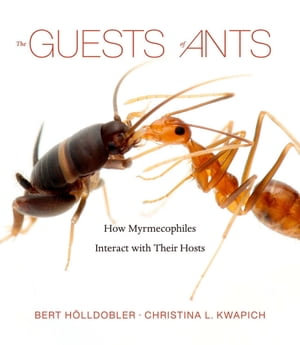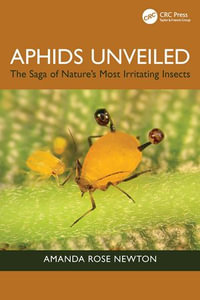
The Guests of Ants
How Myrmecophiles Interact with Their Hosts
By: Bert Hölldobler, Christina L. Kwapich
eBook | 19 July 2022
At a Glance
eBook
RRP $120.79
$102.99
15%OFF
or
Instant Digital Delivery to your Booktopia Reader App
Read on
Android
eReader
Desktop
IOS
Windows
A fascinating examination of socially parasitic invaders, from butterflies to bacteria, that survive and thrive by exploiting the communication systems of ant colonies.
Down below, on sidewalks, in fallen leaves, and across the forest floor, a covert invasion is taking place. Ant colonies, revered and studied for their complex collective behaviors, are being infiltrated by tiny organisms called myrmecophiles. Using incredibly sophisticated tactics, various species of butterflies, beetles, crickets, spiders, fungi, and bacteria insert themselves into ant colonies and decode the colonies’ communication system. Once able to “speak the language,” these outsiders can masquerade as ants. Suddenly colony members can no longer distinguish friend from foe.
Pulitzer Prize–winning author and biologist Bert Hölldobler and behavioral ecologist Christina L. Kwapich explore this remarkable phenomenon, showing how myrmecophiles manage their feat of code-breaking and go on to exploit colony resources. Some myrmecophiles slip themselves into their hosts’ food sharing system, stealing liquid nutrition normally exchanged between ant nestmates. Other intruders use specialized organs and glandular secretions to entice ants or calm their aggression. Guiding readers through key experiments and observations, Hölldobler and Kwapich reveal a universe of behavioral mechanisms by which myrmecophiles turn ants into unwilling servants.
As The Guests of Ants makes clear, symbiosis in ant societies can sometimes be mutualistic, but, in most cases, these foreign intruders exhibit amazingly diverse modes of parasitism. Like other unwelcome guests, many of these myrmecophiles both disrupt and depend on their host, making for an uneasy coexistence that nonetheless plays an important role in the balance of nature.
About the Author
Bert Hölldobler is the Robert A. Johnson Professor in Social Insect Research at Arizona State University. He was previously Professor of Biology and Alexander Agassiz Professor of Zoology at Harvard University and subsequently held the chair for Behavioral Physiology and Sociobiology at the University of Würzburg, Germany. He is an elected member of many academies, including the American Academy of Arts and Sciences, the U.S. National Academy of Sciences, and the German National Academy of Sciences, Leopoldina. He has received many awards, among them the Pulitzer Prize for The Ants, coauthored with E. O. Wilson.
Christina L. Kwapich is Assistant Professor of Biology at the University of Massachusetts, Lowell, and President-elect of the North American Section of the International Union for the Study of Social Insects.
Down below, on sidewalks, in fallen leaves, and across the forest floor, a covert invasion is taking place. Ant colonies, revered and studied for their complex collective behaviors, are being infiltrated by tiny organisms called myrmecophiles. Using incredibly sophisticated tactics, various species of butterflies, beetles, crickets, spiders, fungi, and bacteria insert themselves into ant colonies and decode the colonies’ communication system. Once able to “speak the language,” these outsiders can masquerade as ants. Suddenly colony members can no longer distinguish friend from foe.
Pulitzer Prize–winning author and biologist Bert Hölldobler and behavioral ecologist Christina L. Kwapich explore this remarkable phenomenon, showing how myrmecophiles manage their feat of code-breaking and go on to exploit colony resources. Some myrmecophiles slip themselves into their hosts’ food sharing system, stealing liquid nutrition normally exchanged between ant nestmates. Other intruders use specialized organs and glandular secretions to entice ants or calm their aggression. Guiding readers through key experiments and observations, Hölldobler and Kwapich reveal a universe of behavioral mechanisms by which myrmecophiles turn ants into unwilling servants.
As The Guests of Ants makes clear, symbiosis in ant societies can sometimes be mutualistic, but, in most cases, these foreign intruders exhibit amazingly diverse modes of parasitism. Like other unwelcome guests, many of these myrmecophiles both disrupt and depend on their host, making for an uneasy coexistence that nonetheless plays an important role in the balance of nature.
About the Author
Bert Hölldobler is the Robert A. Johnson Professor in Social Insect Research at Arizona State University. He was previously Professor of Biology and Alexander Agassiz Professor of Zoology at Harvard University and subsequently held the chair for Behavioral Physiology and Sociobiology at the University of Würzburg, Germany. He is an elected member of many academies, including the American Academy of Arts and Sciences, the U.S. National Academy of Sciences, and the German National Academy of Sciences, Leopoldina. He has received many awards, among them the Pulitzer Prize for The Ants, coauthored with E. O. Wilson.
Christina L. Kwapich is Assistant Professor of Biology at the University of Massachusetts, Lowell, and President-elect of the North American Section of the International Union for the Study of Social Insects.
Read on
Android
eReader
Desktop
IOS
Windows
ISBN: 9780674276444
ISBN-10: 0674276442
Published: 19th July 2022
Format: ePUB
Language: English
Publisher: Harvard University Press
You Can Find This eBook In
This product is categorised by
- Non-FictionScienceBiology, Life SciencesZoology & Animal SciencesZoology & InvertebratesInsects & Entomology
- Non-FictionEarth Sciences, Geography, Environment, PlanningThe EnvironmentApplied Ecology
- Non-FictionScienceBiology, Life SciencesZoology & Animal SciencesAnimal Behaviour
- Non-FictionNature & The Natural WorldWildlife in GeneralButterflies, Other Insects & Spiders
























